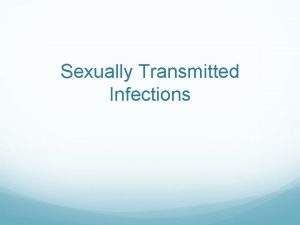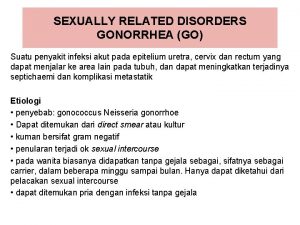Gonorrhea Marissa Miuccio What is it Gonorrhea is










- Slides: 10

Gonorrhea Marissa Miuccio

What is it? Gonorrhea is a sexually transmitted disease (STD) that can infect both men and women. Also called the “drip” or “clap” It can cause infections in the genitals, rectum, and throat. It is a very common infection, especially among young people ages 15 -24 years. The infection is easily spread and occurs most often in people who have many sex partners.

How is It spread? You can get gonorrhea by having anal, vaginal, or oral sex with someone who has gonorrhea. Gonorrhea may also be spread by contact with infected bodily fluids, so a pregnant woman with gonorrhea can give the infection to her baby during childbirth. Gonorrhea is caused by Neisseria gonorrhoeae, a bacterium that can grow and multiply easily in mucus membranes of the body. Gonorrhea bacteria can grow in the warm, moist areas of the reproductive tract, including the cervix , uterus, and fallopian tubes in women, and in the urethra

Prevention Not having sex Being in a long-term mutually monogamous relationship with a partner who has been tested and has negative STD test results Using latex condoms and dental dams the right way every time you have sex.

Risk Any sexually active person can get gonorrhea through unprotected anal, vaginal, or oral sex. Gonorrhea is very common infectious disease in the U. S. Each year, according to the CDC, there as many as 700, 000 new cases, with less than half of them reported to the CDC. There were 309, 341 reported cases of gonorrhea in the U. S. in 2010. Sexually active teenagers have one of the highest rates of reported infections. If you are a sexually active man who is gay, bisexual, or who has sex with men, you should be tested for gonorrhea every year.

How do you know if you have gonorrhea? Some men with gonorrhea may have no symptoms at all. However, men who do have symptoms, may have: A burning sensation when urinating A white, yellow, or green discharge from the penis Painful or swollen testicles (although this is less common). Most women with gonorrhea do not have any symptoms. Even when a woman has symptoms, they are often mild and can be mistaken for a bladder or vaginal infection. Women with gonorrhea are at risk of developing serious complications from the infection, even if they don’t have any symptoms. Symptoms in women can include: Painful or burning sensation when urinating Increased vaginal discharge Vaginal bleeding between periods.

Symptoms Rectal infections may either cause no symptoms or cause symptoms in both men and women that may include: Discharge Anal itching Soreness Bleeding Painful bowel movements

Diagnosis Most of the time, urine can be used to test for gonorrhea. However, if you have had oral and/or anal sex, swabs may be used to collect samples from your throat and/or rectum. In some cases, a swab may be used to collect a sample from a man’s urethra (urine canal) or a woman’s cervix (opening to the womb).

Can gonorrhea be cured? Yes, gonorrhea can be cured with the right treatment. It is important that you take all the medication your doctor prescribes to cure your infection, it will not undo any permanent damage caused by the disease. It is becoming harder to treat some gonorrhea, as drug resistant strains of gonorrhea are increasing. If your symptoms continue for more than a few days after receiving treatment, you should return to the health care provider to be checked again.

What happens if you don’t get treated? Untreated gonorrhea can cause serious and permanent health problems in both women and men. In women, untreated gonorrhea can cause pelvic inflammatory disease (PID). Some of the complications of PID are: Formation of scar tissue that block fallopian tubes Ectopic pregnancy Infertility Long term pelvic/abdominal pain In men gonorrhea can cause painful condition in the tubes attached to the testicles. In rare cases, this may cause a man to be sterile, or prevent him from being able to father a child. Rarely, untreated gonorrhea can also spread to your blood or joints. This condition can be life-threatening. Untreated gonorrhea may also increase your chances of getting or giving HIV.



















